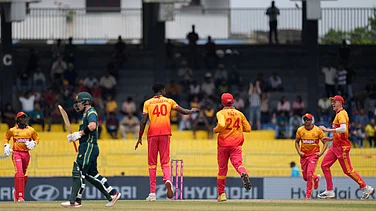46 Days
10 Participants
48 Matches
Statistics: sharp as a spear, dry as dust; shorn of flesh, yet stimulating. When applied to cricket—where flannelled demi-gods toil on freshly shorn greens under a perpetually golden light, where every twist of a game is a byword for life itself—it is oddly addictive. Cricket’s connoisseurs have forever thumbed through their trusted almanacs, glorying in the poetry of the game, yet committing facts to memory like a Gradgrind. As the ICC cricket World Cup draws us in, game after game, into its vortex, here are a couple of stats to warm up with. Five-time champions Australia have won most consecutive matches (25) spanning four World Cups, from 1999 to 2011. They also hold the record of the longest unbeaten streak, of 34 matches, again stretching from 1999 to 2011. Twice winners India are placed second on both lists, with 11 matches apiece; in both cases the period is the same, from 1999 to 2011.
Will the 2019 World Cup be the start of another winning streak for India? Is the team capable of sweeping all opposition? For an answer, we need to examine the 15-member Indian squad. Clearly, a majority of the players (eight) has no World Cup experience, including 33-year-old Dinesh Karthik. Only seven have played in a World Cup earlier. However, most Indian players in the squad toured England last year for a bilateral series, though the final results were, in the end, forgettable. Nonetheless, they became aware of the venues, pitches, and overhead conditions—factors that will help them in their quest for the ultimate triumph.

Under skipper Kohli, India display an aggressive, no-holds-barred approach.
Statistics, that tool of compression and reflection—generous provision should be made for parallax error, though—tells us that though England is the only country to have fielded over 100 players (102) in WC history, the cup has eluded them consistently, despite their reaching the finals thrice (in 1979, 1987 and 1992). But they say cricket is a ‘great leveller’ for a reason: in 2019, on current form, many experts think they are overwhelming favourites to win the Cup, and almost certain to reach the semi-finals. Australia and India, too, are hot title contenders.
“India and England are my favourites. In the past 25 years or so, I have not seen an England one-day team like this one. They are the most balanced team in the Cup. They have the pacers, the spinners, and their batting goes right down till No.11. England now know how to play ODIs, as reflected in their recent record. But they will be under the biggest pressure,” 2011 World Cup-winner and former India pacer Ashish Nehra tells Outlook.

England are in top form and are favourites to win the World Cup.
He refers to England’s ODI record since the 2015 World Cup under Eoin Morgan. The world No. 1 ODI team’s big-hitting approach has particularly been a revelation. They have put up totals over 300 runs on an astonishing 38 occasions in 88 ODIs since March 2015, winning 15 bilateral series out of 19. No other team matches their batting firepower; second-placed India notched up 300-plus scores only 16 times during this period. England’s latest exhibition of brute force was a 4-0 whitewash of a young Pakistan team at home. Jos Buttler, Adil Rashid, Moeen Ali, Tom Curran, and Ben Stokes are key players in a team desperate to break the World Cup jinx.
India, the world No. 2 ODI team, are the other top contenders. Under Kohli, they display an aggressive, no-holds-barred approach. Although not a match for England in batting, they have match-winners in every department, beginning with the Rohit Sharma-Shikhar Dhawan opening pair.
The relative World Cup inexperience can be overcome if all players perform to their potential. Kohli at No. 3 will be as crucial to the team’s batting as Dhoni at No. 6 or 7, both in case of setting a target and chasing one. The other batsmen are Vijay Shankar, K.L. Rahul, Kedar Jadhav, and Karthik. Kuldeep Yadav and Yuzvendra Chahal will be key twirlymen, along with left-armer Ravindra Jadeja, while all-rounder Hardik Pandya will provide ‘balance’ and ballast.
M.S. Dhoni’s enormous experience (341 ODIs) will be crucial, says former India opener Anshuman Gaekwad. “Indian players’ fitness level is good. Their fielding too is good. But India’s biggest advantage is Dhoni. If he helps the team win matches with his experience and wicket-keeping, I would not worry if he doesn’t score many runs,” Gaekwad tells Outlook.

Former India pacer Chetan Sharma, the first bowler with a World Cup hat-trick, also nurses high hopes. “India are playing their best cricket outside home, as evident from their series wins in Australia and New Zealand in January, and that will be important in the World Cup,” he feels. Nehra chips in: “Pandya will have a big role to play as a pacer and as a batsman at No. 7 while fast bowler Jasprit Bumrah will be the ‘x factor’. I don’t think India will feel the absence of an off-spinner.”
In their last competitive ODI series before the WC, India lost 2-3 to Australia at home after having led 2-0. That unseemly loss was drowned in the din of the IPL. “If we live up to our skill sets and our standards that we set for ourselves, we’ll be on the right side of the result. Every game you have to play to the best of your potential because it’s not a group stage anymore; it’s playing everyone once,” Kohli said, referring to the round-robin format. India, however, began poorly and lost a World Cup warm-up game to New Zealand after their top-order collapsed under method pace bowling.
Then there are perennial Cup heavyweights Australia, the defending champions. They have won their past eight ODIs, including the upset win in India, and seem to be peaking at the right time. “After India and England, Australia will be my favourite. The return of Steve Smith and David Warner gives them teeth; they have a game-changer in Glenn Maxwell, who also bowls off-spin. The team that will bowl well—and also handle pressure well—will win because everyone is going to score lots of runs on these English pitches,” predicts Nehra.
Australian opener Usman Khawaja has been in roaring form. In his last eight innings, he has scored 104, 91, 100, 24, 88, 0, 62 and 98. He has been opening with Aaron Finch successfully. Aussie tearaways, too, have been in ripping form—a good augury for them. Overall, Australia have plenty of ammo to win their sixth World Cup. “Their confidence will be high. I would even put them ahead of India as favourites. Australia definitely have the edge, depending on the type of pitches they play on,” says Chetan.
Pakistan, as usual, could be unpredictable. They are a young side woefully shorn of World Cup experience—ten out of 15 players are new to a World Cup and thus would face its intense, knee-weakening pressure. Further, they have a poor recent record in ODIs—a solitary win in their last 14 matches. But despite the odds, former Pakistan captain Zaheer Abbas is optimistic about their prospects. “My four teams for the semi-finals would be India, Pakistan, Australia, and England. My hope for the Pakistan team emanates from the English pitches, which are similar to those in the subcontinent. If this Pakistani team can make, and almost overhaul, 300-plus totals on those pitches against England recently, then chances are that tall scores will be made in the Cup,” Abbas tells Outlook.
Chetan also gives Pakistan, champions in 1992 and runners-up in 1999, a fair chance. “Playing competitive matches is important before a World Cup. While the other national teams were playing practice matches, Pakistan was involved in an ODI series against England in England and before that against Australia in the UAE. Defeats don’t matter now, it’s the English conditions that Pakistanis would have got used to. They will be ready from ball one,” he insists. But Pakistan’s dismal run in England continued as they lost a World Cup warm-up match to minnows Afghanistan.

New Zealand are the dark horses.
New Zealand may not have won a World Cup yet, but they start as the dark horse of the 12th edition of the showpiece event. The Kane Williamson-led Kiwis, ranked No. 4, warmed up by beating Bangladesh 3-0 in February, during which both their batting and bowling were sharpened to perfection. “My fifth [favourite] team will be New Zealand. They have entered the semi-finals seven times. But you cannot rule them out completely,” warns Zaheer Abbas. Unlike Pakistan, New Zealand will have the disadvantage of not having scheduled an ODI series closer to the tournament. Like other teams, they will, however, play a couple of warm-up matches.
That leaves us with two-time champions West Indies as well as South Africa, whom one cannot ignore. West Indies, led by lanky all-rounder Jason Holder, are a very good T20 team and can be an equally good ODI side. If there has been any improvement in the West Indies’ ranks just before the WC, it was not reflected in their three surprise defeats in a tri-nation series in Ireland this May. Amongst the losses was the final against Bangladesh. The Caribbean team managed to beat only Ireland, the host team, twice. The West Indies will have to hit the ground running, as they return to a country where they so spectacularly, so authoritatively, won the first two World Cups in 1975 and 1979, before famously falling to India in the 1983 final.

S.Africa must play to potential.
World No. 3 South Africa can be dangerous on a given day, despite the snide moniker ‘chokers’ being their dogged companion—a constant reference to their history of failing to cross the line in a variety of ways since their return to international cricket in 1992. Faf du Plessis’s boys, however, warmed up with a commanding 5-0 whitewash of Sri Lanka in March in South Africa. Destitute of the genius of A.B. de Villiers, but possessing the incisive potential of Kagiso Rabada and Imran Tahir, they could end up making history.
Then, there are Bangladesh and Afghanistan, while Sri Lanka, champions in 1996 and runner-up in 2007, are in poor form. The Lankans have lost consecutive bilateral series to England, New Zealand, and South Africa since October. Mashrafe Mortaza’s Bangladesh are, however, gung-ho after their first ever multi-nation ODI title triumph on May 17, when they edged out the West Indies in a rain-truncated final in Dublin. And don’t discard powerfully built Afghanistan, who are playing their second World Cup. They have some of the most talented, exhilaratingly free-flowing players—World No. 1 Rashid Khan, the ace leg-spinner, and 21-year-old imposing left-handed batsman Hazratullah Zazai, who this February smashed a 62-ball 162 not out, including a record 16 sixes, against Ireland in Dehradun.
A troupe of exciting, talented players will display their prowess at the 46-day tournament. A total of 406 matches have been played so far in 11 World Cups; another 48 will be added in 2019, culminating with the final at Lord’s, London, on July 14. Who will be the new champions? Keep a rash of statistics by your side (do!) and take an educated guess.


























